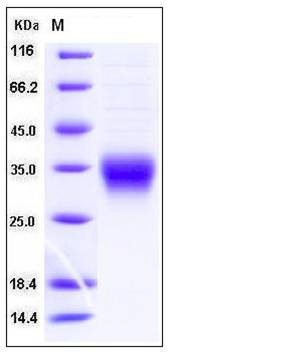Mouse CD8a / Lyt2 Protein (His Tag)
BB154331,Ly-2,Ly-35,Ly-B,Lyt-2
- 100ug (NPP1189) Please inquiry
| Catalog Number | P50389-M08H |
|---|---|
| Organism Species | Mouse |
| Host | Human Cells |
| Synonyms | BB154331,Ly-2,Ly-35,Ly-B,Lyt-2 |
| Molecular Weight | The secreted recombinant mouse CD8a consists of 180 amino acids and has a calculated molecular mass of 20.3 kDa. As a result of glycosylation, the recombinant protein migrates as an approximately 35 kDa protein in SDS-PAGE under reducing conditions. |
| predicted N | Lys 28 |
| SDS-PAGE |  |
| Purity | > 95 % as determined by SDS-PAGE |
| Protein Construction | A DNA sequence encoding the extracellular domain of mouse CD8a (NP_001074579.1) (Met 1-Tyr 196) was expressed, with a C-terminal polyhistidine tag. |
| Bio-activity | 1. Measured by its ability to bind biotinylated recombinant human B2M in a functional ELISA. 2. Measured by its ability to bind biotinylated recombinant human FCGRT+B2M in a functional ELISA. 3. Measured by its ability to bind biotinylated recombinant human LCK in a functional ELISA. |
| Research Area | Immunology |Signal Transduction |Metabolism |Types of disease |Metabolism in Cancer |
| Formulation | Lyophilized from sterile PBS, pH 7.4 1. Normally 5 % - 8 % trehalose, mannitol and 0.01% Tween80 are added as protectants before lyophilization. Specific concentrations are included in the hardcopy of COA. |
| Background | Human T-cell surface glycoprotein CD8 alpha chain, also known as CD8a, is a single-pass type I membrane protein. The CD8 glycoprotein is expressed by thymocytes, mature T cells and natural killer (NK) cells and has been implicated in the recognition of monomorphic determinants on major histocompatibility complex (MHC) Class I antigens, and in signal transduction during the course of T-cell activation. Both human and rodent CD8 antigens are comprised of two distinct polypeptide chains, alpha and beta. The Ig domains of CD8 alpha are involved in controlling the ability of CD8 to be expressed. Mutation of B- and F-strand cysteine residues in CD8 alpha reduced the ability of the protein to fold properly and, therefore, to be expressed. Defects in CD8A are a cause of familial CD8 deficiency. Familial CD8 deficiency is a novel autosomal recessive immunologic defect characterized by absence of CD8+ cells, leading to recurrent bacterial infections. |
| Reference | References Devine, L. et al., 2000, J Immunol. 164 (2): 833-8. Arcaro, A. et al., 2000, J Immunol. 165 (4): 2068-76. Saha, K. et al., 2001, Nat Med. 7 (1): 65-72. Romero, P. et al., 2005, Eur J Immunol. 35 (11): 3092-4. |
